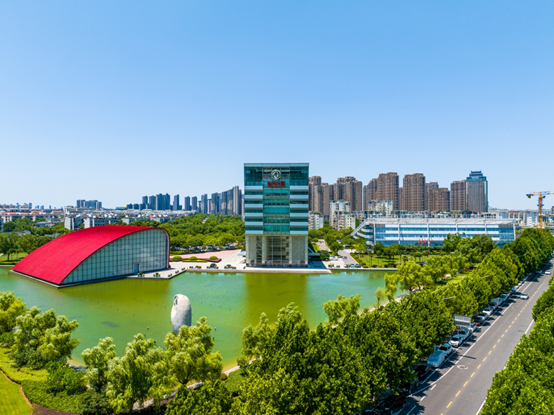

The headquarters of Dongfeng Motor Corporation in the Wuhan Economic & Technological Development Zone. [Photo provided to en.whkfq.gov.cn]
Dongfeng Motor Corporation and Huazhong University of Science and Technology on July 25 signed a strategic cooperation agreement to enhance collaboration in technological research, commercialization, and talent cultivation in the Wuhan Economic & Technological Development Zone (WEDZ).
On the same day, the HUST-Dongfeng Research Institute was inaugurated, focusing on new energy intelligent vehicle technology, including research in new energy power systems, automotive software and artificial intelligence, and lightweight technology.
The institute aims to invest in experimental facilities and equipment and produce groundbreaking and innovative results to support the transformation and upgrading of China's automotive industry, according to authorities.
Liu Ziqing, Party secretary of WEDZ, emphasized in his speech that the partnership between Dongfeng Motor and HUST represents a new model and exemplar of industry-education integration, and expressed hope that this collaboration would attract more resources, projects, and talent to the zone, facilitating industrial transformation and upgrading, optimizing the population structure, and driving technological innovation.
Liu assured that the zone would continue to provide comprehensive support to both Dongfeng Motor and HUST, fostering a mutually beneficial future.
Zhou Zhiping, general manager of Dongfeng Motor, stated that the collaboration with HUST will enable both sides to capitalize on their respective strengths, accelerating the growth of strategic emerging industries such as new energy and intelligent connected vehicles and setting a benchmark for high-quality industry-academia cooperation.
You Zheng, president of HUST, remarked that the collaboration with Dongfeng Motor is a crucial step in fostering new quality productivity, strengthening the integrated reform of education, science, and technology talent systems, and achieving high-quality development.
According to the agreement, both parties will accelerate the realization of high-level technological self-reliance and self-improvement, planning and promoting major scientific research cooperation projects in new battery technologies, artificial intelligence, and other fields.
They will also advocate the sharing of scientific achievements, jointly develop international and national industry standards, and promote the industrialization of scientific research achievements.
In addition, the collaboration will intensify talent engineering efforts, establishing an engineer technology center, sharing teaching and training resources, expanding specialized training for engineering master's and doctoral degrees, and jointly recruiting and exchanging high-level talent for mutual development.